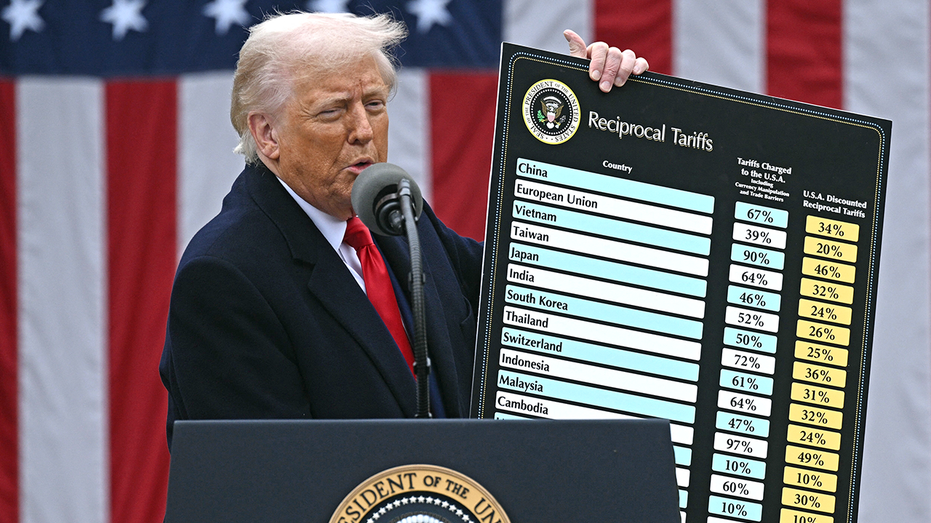Trump Prescribes a 'Prognosis' for America After Tariffs in Bold Medical Metaphor

Sarah Johnson
April 3, 2025
Brief
President Trump declares victory for his reciprocal tariffs plan, aiming to boost U.S. manufacturing and jobs, despite market concerns and debate over economic impacts.
President Donald Trump pulled out his medical metaphor toolbox on Thursday, declaring his "reciprocal tariffs" plan a success and dubbing the day "Liberation Day." With characteristic flair, Trump took to TRUTH Social to announce, "THE OPERATION IS OVER! THE PATIENT LIVED, AND IS HEALING. THE PROGNOSIS IS THAT THE PATIENT WILL BE FAR STRONGER, BIGGER, BETTER, AND MORE RESILIENT THAN EVER BEFORE. MAKE AMERICA GREAT AGAIN!!!"
While the Dow Jones Industrial Average took an immediate hit, plummeting by over 1,000 points Thursday morning, the administration remained optimistic. Officials touted the potential for onshoring U.S. manufacturing and bolstering American jobs, painting the tariffs as a long-awaited remedy to decades of economic drawbacks.
White House Press Secretary Karoline Leavitt didn’t hold back while defending the plan on CNN, labeling America's trade deficit a "national emergency." Leavitt emphasized the $1.2 trillion deficit, the closure of 90,000 factories, and the loss of five million American manufacturing jobs since 1997. "These are not just statistics. These are real American lives that have been impacted," she said. "It's about time we have a president who actually does something about it." She hinted that foreign nations had decades to "do the right thing" but had chosen otherwise, accusing them of exploiting American workers.
Vice President JD Vance wasn’t shy about pointing fingers at the "globalist economy." In a Thursday interview on Fox & Friends, he argued that tariffs would reverse a system in which the U.S. incurs debt to buy goods manufactured overseas. "To make it crystal clear, we borrow money from Chinese peasants to buy the things those Chinese peasants manufacture," Vance quipped, with razor-sharp sarcasm. He promised Trump’s tariffs would steer the country away from the "Joe Biden globalist pathway" that, according to him, left the U.S. with $2 trillion in debt and dwindling manufacturing capacity.
Vance also addressed Wall Street concerns. "A lot of people have gotten rich from American jobs moving overseas, but American workers have not," he said. "They charge us ridiculous tariffs. They manipulate currencies. That has been awful for Main Street in America." He dismissed fears of inflation, arguing that deregulation under Trump’s administration would help drive costs down.
Commerce Secretary Howard Lutnick chimed in, assuring CBS News viewers that while foreign goods might see price hikes, domestic goods would remain affordable. "For the first time in your lives, you're going to actually think about the Americans who make the products," Lutnick said. He highlighted the administration's $5 trillion in committed investment, vowing that factories would start sprouting across the U.S. like wildflowers in spring.
Lutnick painted a rosy picture of immediate job creation, predicting "hot shifts" in factories nationwide and a leap in employment. "All that construction work begins now," he said. "You're going to see plants being built, factories rebuilding. All shifts are going to be running hot across America now." If his vision pans out, the administration’s already-added 150,000 jobs in March might seem like a mere appetizer before the main course.
Despite the dramatic language and bold promises, critics remain wary of the potential economic ripple effects, particularly the possibility of rising costs for American consumers. But for Trump and his team, the tariffs represent a strategic effort to prioritize domestic industry and workers—even if it comes with some temporary turbulence.
Topics
Editor's Comments
Trump's medical metaphor was certainly colorful, but it also felt like a bit of a stretch—an operation with no anesthesia, perhaps? While the administration paints a promising picture of factories buzzing with activity, the skeptics aren’t wrong to wonder if the medicine will have side effects. You can almost hear Wall Street asking for a second opinion.
Like this article? Share it with your friends!
If you find this article interesting, feel free to share it with your friends!
Thank you for your support! Sharing is the greatest encouragement for us.



